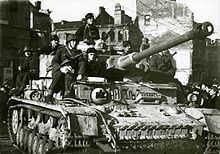Niš operation
| Niš operation | |||||||
|---|---|---|---|---|---|---|---|
| Part of World War II in Yugoslavia | |||||||
 |
|||||||
|
|||||||
| Belligerents | |||||||
|
|
|
||||||
| Commanders and leaders | |||||||
|
|
unknown | ||||||
| Strength | |||||||
|
|
7th SS Volunteer Mountain Division Prinz Eugen (21, 500 men, 154 guns, 164 mortars, 38 tanks and 18 airplanes) | ||||||
| Casualties and losses | |||||||
|
|
5200 dead or wounded, 3580 POW, captured: 97 guns, 720 machine guns, 1100 vehicles | ||||||
Niš operation (Serbian: Нишка операција, Bulgarian: Нишка операция) was an offensive operation of the Bulgarian army, supported by Yugoslav Partisans against German Army Group E in order to secure the left flank of the Third Ukrainian Front of the Red Army.
It was held from 8 to 14 October 1944. Second Bulgarian Army, in cooperation with Yugoslav People's Liberation Army and IX Air Corps of the Red Army was ordered to destroy the German troops and to seize Niš. Its enemy was 7th SS Volunteer Mountain Division Prinz Eugen, or about 21 500 people from 13 infantry battalions, featuring 154 guns, 164 mortars, 38 tanks and 18 aircraft. Their task was to cover the retreat of 300,000 German soldiers from the composition of the Army Group "E". Bulgarian troops entered the brunt along the River Southern Morava. On October 10, the Sofia armored brigade, consisting of about 150 tanks, most of which Panzer IV, and the rest Panzer 38(t) and Panzer 35(t), aided by ca. 40 Leichter Panzerspähwagen, and 50 Sturmgeschütz III, penetrated in the defense of the Germans and forced them to retreat west of the Southern Morava. On 12 and 13 October Bulgarian troops continue pursuit. On October 14 parts of the VI Infantry Division, using the jab from the south of the armored brigade seized Niš and completely pushed the Nazis. Losses of the Wehrmacht amounted up to 5200 killed and 3850 prisoners of war, but they managed to hold its position in the Vardar corridor to the withdrawal of the remaining German troops.
...
Wikipedia
